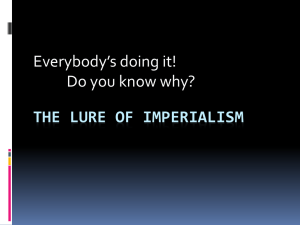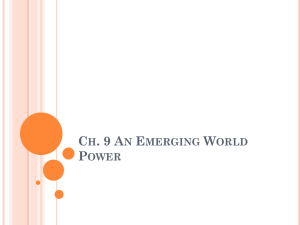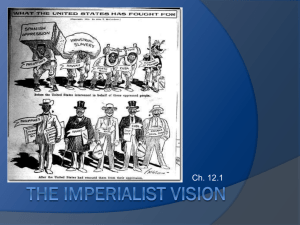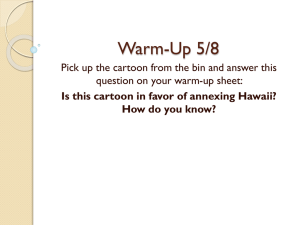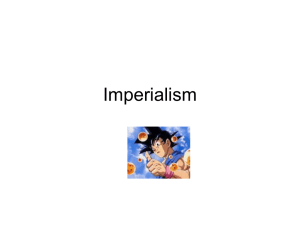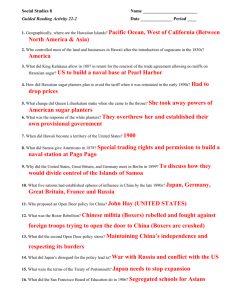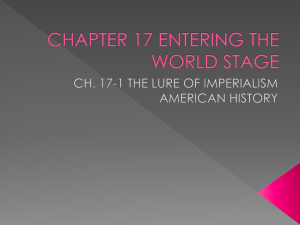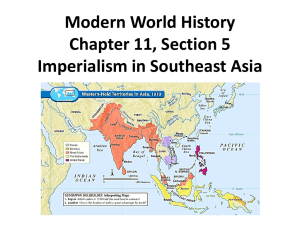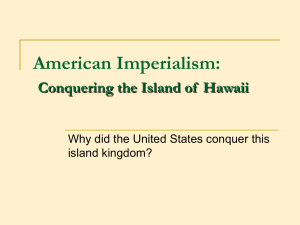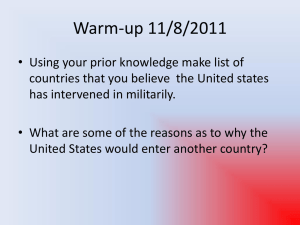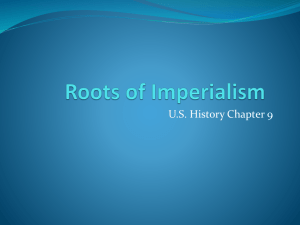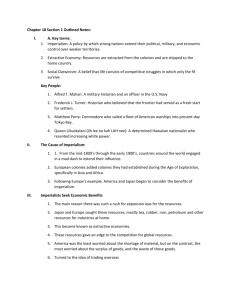17.1 - MollyMcDuffiesPortfolio
advertisement
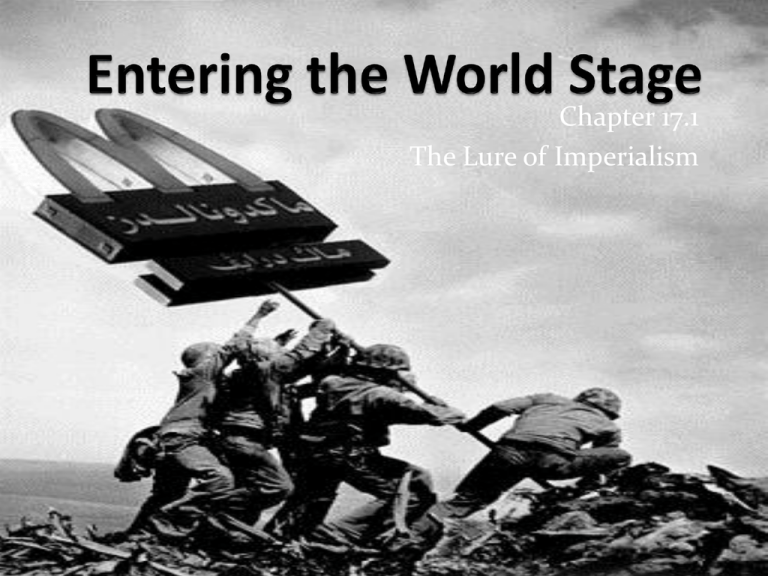
Chapter 17.1 The Lure of Imperialism Focus Your Thoughts . . . What is imperialism? What ideas/mentalities might have contributed to this? Imperialist Activity Imperialism – The scramble for territorial control, specifically, territorial control of land in Africa, Asia, and Latin America; the extension of a nation’s power over other lands. What were we motivated by? Economic Interests, Military Needs, & Ideology Economic Interests – The industrial revolution had brought great prosperity to the western world; they began looking to other nations for new customers and new places to invest. Military Needs – Industrialized nations created strong navies to defend their shores and protect their trading interests; these navies needed bases where their ships could refuel and be repaired. Ideology 1. A sense of nationalism, love of one’s country, made many individuals interested in imperialism; they felt that territorial conquests enhanced the nation’s power and prestige. 2. A feeling of cultural superiority , a belief that one’s way of life is superior to everyone else’s, made many people considered it our social responsibility to “civilize” less industrialized nations. The Scramble for Territory By the late 1800’s, the British Empire controlled about one-quarter of the world’s land and population In the mid-1800’s Americans believed it was their manifest destiny to expand westward to the Pacific Ocean . . . now, people sought to move even beyond the shoreline, to claim distant islands farther west. What islands do you think we’re interested in? T.T.Y.N. Talk to Your Neighbor What were the three main reasons that industrialized nations became imperialist nations? In addition to “civilizing” less industrialized nations, what other belief systems or values might we have been trying to spread through imperialism? Taking Control of Hawaii Eight main islands – Niihau Kauai Oahu Maui Molokai Lanai Kahoolawe Hawaii The most isolated population center on the face of the earth Why would Hawaii, located in the middle of the Pacific Ocean, be a hot commodity for imperialist nations? Sugar Interests Gain Power As more and more Americans began to travel to the islands, investors in the sugar industry began increasing their control With so few native Hawaiians left - the population dropped from 300,000 to 40,000 thanks to foreigners who brought diseases – planters brought in workers from China, Japan, and the Philippines But . . . King Kalakaua resented the Americans’ influence over his government Plotting Against the King A group of American businessleaders, planters, and traders formed a secret society called the Hawaiian League; its purpose was to overthrow the monarchy and establish a democracy in Hawaii The Sugar Treaty – Allowed Hawaii to export sugar to the United States tax free . . . in exchange, American’s wanted the port of Pearl Harbor Kalakaua refused Americans forced him – at gunpoint – to sign a new Constitution referred to by the king as the Bayonet Constitution which severely restricted the power and deprived most Hawaiians of the vote This forced King Kalakaua to give up Pearl Harbor The United States then revoked the Sugar Treaty anyway, damaging the Hawaiian economy and forcing them into dependency on the U.S. and talks of annexation. What does it mean to “annex” something? End of the Monarchy When King Kalakaua died in 1891, his sister Liliuokalani became Queen Queen Liliuokalani was a Hawaiian nationalist and wanted to restore power to the monarchy Members of the business community plotted to overthrow her and sent U.S. Marines ashore without authorization They surrounded the royal palace aiming machine guns and cannons and forced her surrender Annexation While President Grover Cleveland was “troubled” by the events surrounding Queen Liliuokalani’s removal from power, he was unwilling to send in troops to defend her When William McKinley took over the Presidency, Hawaii became an American territory in 1898 and, eventually, the 50th state to join the Union (1959) It wasn’t until 1993 that Congress issued a formal apology for the United States’ role in overthrowing Liliuokalani Influence in China China remained fairly isolated from the rest of the world In 1842, Great Britain forced China to open four additional ports for trade; two years later the United States received access to these same ports China’s rulers struggled to keep foreign interests from overrunning the country, but the threat wasn’t solely from Western nations Russia, France, Germany and Great Britain also held spheres of influence A geographic area where an outside nation exerts special economic or political control The Open Door Policy The United States was too late to secure a sphere of influence in China and American leaders feared that the United States would be shut out of the valuable Chinese trade, as a result, Secretary of State John Hay proposed the Open Door Policy The Open Door Policy – All nations shall have equal trading rights in China The Boxer Rebellion With foreign countries now vying for business in China, antiforeigner sentiments grew and a secret group called the Society of Righteous and Harmonious Fists – known to Westerners as Boxers – began attacking foreign missionaries and Chinese Christians In June of 1900, they led what became known as the Boxer Rebellion, laying siege on the capital city of Beijing This rebellion was put down by the western nations and increased support for Hay’s Open Door Policy T.T.Y.N. Talk to Your Neighbor Why did Hay propose the Open Door Policy? Why would the Western nations think it was in their best interests to put down the Boxer Rebellion? Influence in Japan Until Japan seized Taiwan from China in 1895, no one would have thought of the Japanese as imperialists; rather, they were very isolationist. In 1853, the United States began pressuring Japan to open its ports to international trade by demonstrating their naval strength under the command of Commodore Matthew Perry who sent a fleet of four ships to the as-yet unindustrialized nation In 1854, aware that they could not defend themselves against a modern navy, Japan opened its harbors and embarked on a program of rapid modernization and began eyeing additional territories Korea and Manchuria The problem? Russia wanted these territories too! The Russo-Japanese War In 1904, the Russo-Japanese War broke out, taking a toll on both sides . . . by the following Spring, both sides had had enough At Japan’s request, Teddy Roosevelt helped negotiate a peace treaty, later winning a Nobel Prize for Peace for his efforts Japan was the clear victor in the war with Russia, and it emerged as a major power and a rival to the United States for influence in China and the Pacific sparking concerns In 1907, Teddy Roosevelt decided he wanted to impress upon Japan – and the rest of the world – just how powerful the U.S. military was . . . And sent four squadrons of battleships, known as the Great White Fleet, on a 43,000 mile around-the-world journey Assignment Reviewing Ideas, Terms, and People (Pg. 557) Define: What is imperialism? Summarize: What were the main incentives for countries to seek new territories? Recall: Why did its location make Hawaii attractive to Americans? Draw Conclusions: What role did sugar play in the desire of many Americans to control Hawaii? Elaborate: How did American sugar planters go outside the law to gain control over Hawaii? Describe: What was the Open Door Policy? Explain: Why did Americans think they might be at a disadvantage trading with China? Predict: What would have been the likely consequences for the United States if other western powers had divided China into colonies instead of accepting the Open Door Policy? Identify: Who was Commodore Perry? Analyze: Why did the United States want to impress Japan in particular with the Great White Fleet?
